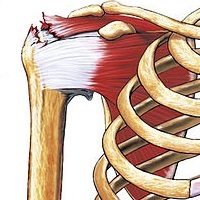
Photo from wikipedia
ABSTRACT Total knee arthroplasty (TKA) is effective for pain reduction in most patients, but 15% or more report unsatisfactory long-term pain outcomes. We tested whether oxidative stress (OS) related to… Click to show full abstract
ABSTRACT Total knee arthroplasty (TKA) is effective for pain reduction in most patients, but 15% or more report unsatisfactory long-term pain outcomes. We tested whether oxidative stress (OS) related to extended tourniquet application during TKA and subsequent ischemic reperfusion contributed to adverse post-TKA pain outcomes. Blood samples were obtained in 91 osteoarthritis patients (63% female) undergoing TKA prior to tourniquet placement (T1), 45 minutes after tourniquet inflation (T2), and 15 minutes following tourniquet removal (T3). Plasma levels of F2-isoprostanes and isofurans, the most specific measures of in vivo OS, were quantified. Pain intensity and function were assessed at baseline and again at 6 weeks and 6 months following TKA. Results indicated that higher Combined OS (F2-isoprostanes+Isofurans/2) at T1 baseline as well as larger increases in Combined OS from T1 to T2 were associated with higher baseline-corrected past 24-hour worst and average pain intensity (numeric rating scale) and higher past week McGill Pain Questionnaire-2 total scores at 6-month follow-up (p's <.05). Increases in Combined OS from T1 to T3, which should most directly capture OS and ischemic reperfusion injury related to tourniquet use, were not associated with short-term or long-term post-TKA pain outcomes. Longer ischemia duration was unexpectedly associated with lower baseline-corrected pain intensity at 6-month follow-up. Combined OS was not linked to functional outcomes at either follow-up. Elevated perioperative OS appears to exert small but significant adverse effects on long-term post-TKA pain outcomes, although this OS appears unrelated to ischemic reperfusion injury associated with extended tourniquet use.
Journal Title: Pain
Year Published: 2022
Link to full text (if available)
Share on Social Media: Sign Up to like & get
recommendations!